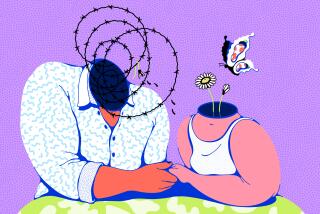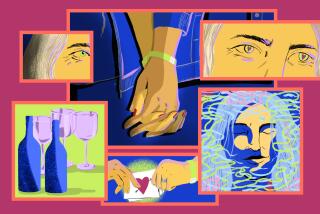A chorus of ghosts watches over David Levithan’s ‘Two Boys Kissing’
When it came out in 2003, David Levithan’s young-adult debut, “Boy Meets Boy,” had the pinkish glow of wish fulfillment. Its gay-teen hero found love in a small-town utopia where parents embraced children’s differences, jocks treated queers as peers, and a cross-dressing high school quarterback could double as head cheerleader. So much peace, love and understanding — at a time when homosexuality was illegal in 14 states, when “Don’t ask, don’t tell” and the Defense of Marriage Act were the laws of the land, and the murder of Matthew Shepard was fresh in memory.
But fantasy can sometimes be the last refuge of prescience, and in the intervening years, Levithan’s world has found real-life equivalents: anti-harassment training, anti-bullying initiatives, PSA campaigns, straight-gay alliances, gay proms … and, in the time slot once known as “family hour,” a gay TV high-schooler named Kurt chasing love on “Glee” as unapologetically as his glee-club pals.
An author so vindicated might be excused for laying on more magical thinking. But the surprise of Levithan’s newest book, “Two Boys Kissing,” comes from how stubbornly it complicates that earlier vision.
Consider that the number of boys kissing is, at minimum, seven. Consider that they come to kissing with varying degrees of readiness. The wretched closet-case Cooper knows only what he’s gathered from Internet porn sites and chat rooms — data that leave him drastically unprepared for flesh and blood. Ryan (hair of robin’s-egg blue) and Avery (hair of Mary Kay Cadillac pink) have just met at a dance and don’t yet know if they’re a couple. Peter and Neil have been together for a year — an eon in teen terms — but even their embraces are complicated because Neil hasn’t owned up to his parents.
As for Craig and Harry, they are no longer a couple, but to protest a recent gay-bashing they have decided to lock lips in front of their high school and, with cameras running and the whole world looking, hold their kiss until they’ve broken the world record. Over the next 32 hours, 12 minutes, 10 seconds, their piece of street theater will ripple through and beyond their community, leaving parents wiser about their kids, and kids a bit wiser about the world around them.
Levithan interweaves all these players with surgical skill and with an unabashed attention to bodies. If the book’s title doesn’t get it banned from a thousand school libraries, its frankness will: “Peter lingers his hand down Neil’s back, slips his fingers beneath his waistband, rests on the skin there, the heat. Neil moves in the opposite direction, his hand rising under the back of Peter’s shirt, between his shoulder blades. ... Neil touches the nape of his neck, then slowly retreats back down, fingernails raking skin….”
What sets this book apart from Levithan’s previous work (including the charming “Will Grayson, Will Grayson,” co-written by John Green) is its yearning for tragedy. For brooding over these youths is a Greek chorus of ghosts: the generation of gay men who lived and loved and died in the first onslaught of AIDS.
“We are your shadow uncles,” they declare, “your angel godfathers, your mother’s or your grandfather’s best friend from college, the author of that book you found in the gay section of the library.”
Denied true agency, Levithan’s spirits can only watch the story unfurl, enlarging its meanings where they can and tease out cross-generational epiphanies. They nod in silent commiseration, for instance, when a teenage boy accidentally outs himself:
“That one mistake. That stupid slip. The magazine left spread-eagled on the floor. The love notes hidden under the mattress, the most obvious place. The torn-out underwear ad folded in the dictionary, destined to fall out when the dictionary is opened. The doodles we should have burned. The writing of another boy’s name, over and over, over and over. The clothes shoved in the back of the closet. ...”
Again and again, the present calls back the past. In one particularly powerful moment, Harry coughs into Craig’s mouth, evoking the rattles of old deathbeds. “For every one of us who was able to die peacefully on a deck chair, blanket pulled high, as the wind stirred his hair and the sun warmed his face, there were hundreds of us whose last glimpse of the world was white walls and metal machinery, the inadequate flowers in a vase, elected representatives from the wilds we had lost. Our last breaths were of climate-controlled air. We died under ceilings.”
It spoils nothing to say that Levithan swings his story back toward life. He is too dedicated, too intentional an optimist to let darkness spread unchecked, and he knows — we all know — that two boys may kiss with more impunity today in America than a decade ago.
But even in noting that progress, a reader can’t shake the dead souls to which Levithan has given such eloquent voice: “We will never kiss our mothers again. We will never see our fathers. We will never feel air in our lungs. We will never hear the sound of our voices. We will never feel snow or sand or take part in another conversation. Everything was taken from us, and we miss it. We miss all of it.”
Bayard is a novelist and author of the upcoming “Roosevelt’s Beast.”
Two Boys Kissing
By David Levithan
Knopf: 208 pp. $16.99, ages 12 and up
More to Read
Sign up for our Book Club newsletter
Get the latest news, events and more from the Los Angeles Times Book Club, and help us get L.A. reading and talking.
You may occasionally receive promotional content from the Los Angeles Times.







